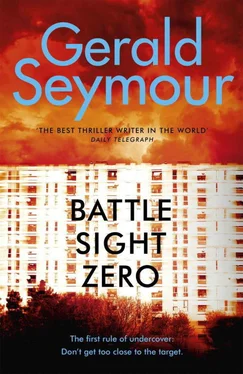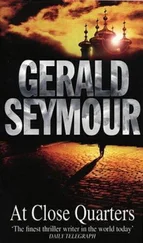It was not his business, beyond his remit.
Another of those bloody instructors would have said, ‘Something to remember: you do not get caught up in events that are beyond the remit. You stay focused and remain inside the tramlines of your assignment. Anything else and you drift away, go far into the shadows. What is paramount to remember is that personal feelings have no place in the governing of your reactions. Hold on to that and you’ll be fine. Ignore that and you will finish up at the wrong end of shit-creek… It’s simple, and keep things that way – simple.’ He was out of the car, left the door open and the engine running, and his rucksack and her bag were in the boot.
He wondered why the police had not fired on them. They did not run fast but would have made difficult targets because the boy had the wit to move with a low gravity centre, and to duck and to zigzag, and the girl, Zed, followed his lead and was pulled after him. She clutched the rifle, and a second magazine bulged from her hip pocket. Perhaps they had been ordered not to fire, perhaps no one in authority had told them anything and had abandoned them to ‘use your own initiative, boys, girls, and we’re all behind you’, the big cop-out anthem.
Nobody told him what he should do, and nobody was there for him to ask. He started to jog up the street. He could recall the good times with the girl and the bad times. He went faster, lengthened his stride.
Behind him, the sirens had been silenced. Ahead of them, astride the slope of a hill, was a housing estate, close-set windows, grey-white walls pocked with satellite dishes, blue sky and bright sunshine and a lapping wind that blew the washing suspended from balcony wires. That would be their goal, their place of safety. An old slogan was in his mind, what an officer would have lectured them at Lympstone, what they searched for among recruits – First to understand, first to adapt and respond, and first to overcome , and the officer might just have nodded approval. His advantage, to be exploited, was that the police where the stingers had been thrown, were all looking up the road. He went over the silver lines, hopped over the spikes. There was a perfunctory yell but he ignored it, ran easily. The two of them, in front of him, both limping and in obvious pain, went close to the spectators.
He ran past the scooter, the tyres gone, the tank leaking fuel, dumped in the centre of the street, and useless; he had seen it in the square below the hotel window, and the street-light had shown him the pride with which the boy had climbed on to it and gunned the engine and waved for her to sit behind him, settle on the pillion. He was noticed. A policeman stood up from his crouching position and attempted to block him, jabbered in a language that neither Andy Knight, nor Phil nor Norm, would have been familiar with, and then he was waved aside and grabbed at the anorak and shaken clear, and squeaked something which was ignored, but he did not shoot.
He heard far behind him a woman’s bellowing voice. ‘You fucking idiot, come back here.’
Then a plaintive voice, her superior’s. ‘Friend, this is not a good idea. Don’t go any farther.’
‘She’s not your business, not now the whole thing is wrecked.’
‘I really do urge you to turn around.’
The boy and Zed were gone from sight. The crowd on the pavement had engulfed them, one moment he could see them, their heads bobbing, and the next a mess of shoulders and backs made a screen around them. They were inside a clamour of noise. The mob had claimed them… Like a great caterpillar, the crowd seemed to wriggle up the hill. He caught a glimpse of the tip of the barrel of the assault rifle, and he imagined her thrill at being among people so loving, so admiring; she would have felt herself a fighter and cherished.
Behind him, the couple that he knew as Gough and Pegs, a team suckled on police culture, had managed to run – or hustle – and had closed on him, had stepped over the tyre shredder, were past the scooter. The voices were faint.
She bawled, ‘Gone native, have you? You’re finished. You’re nothing, you’re history.’
He called, ‘You are in the way of an arrest operation. Do not go any farther.’
He looked over his shoulder. Gough had indeed run and now leaned against a lamppost and heaved as he sucked air into his lungs. Pegs, who used cheerful building site obscenities, now stood in the road with her back bent and might well be vomiting on her shoes. Walking briskly, at the head of a small phalanx of uniforms, was a plain clothes officer, suit and tie, straight-backed, and in his fist was a pistol, carried easily… half a pace back from him was a man with a balaclava masking his face, carrying what he recognised as a Steyr sniper’s rifle, the SSG 69, what an élite marksman would have chosen, a weapon of quality and with reputation. He started running again. He heard the name murmured, like the rustle of dead leaves hurried by a wind: Samson. The voices were from the people who had lined the pavements down the hill, where the stingers had been used.
He followed the crowd who escorted the boy and Zed, made ground on them.
Chaos, it seemed.
More sirens and more vehicles arriving, and the road blocked, and in the middle of the lights and the confusion was the Volkswagen Polo with the driver’s door hanging open. Municipal police on site, and with their own command chain, and Major Valery seeking to confirm primacy. Kids gathering, bricks in their hands. A thunder of vehicle horns because a busy road was blocked and the tailbacks grew. A crowd jeering, except when one particular man passed. And a caterpillar of people, wriggling along, carried two fugitives to an entry road into the La Castellane project… rumour running riot, some claimed to have seen a foreign girl, ethnic Asian, carrying an aged Kalashnikov, and reports said she had already fired at the police, but there was no blood on the street or the pavement, only an abandoned scooter.
And the street filled, and mobiles summoned more people to come, and the word was passed that the executioner himself was there…
Gough said, ‘Little for us to be proud of.’
Pegs said, ‘In the big scheme, we are small beer.’
They stood apart. Order was being restored. The marksman had slipped away. The Major was in a tight knot of officers and seemed to be laying down terms and conditions for the next phase. Obvious to all that both of them had attempted to call back their man, and had been ignored. Gough had called it ‘a Nelson moment’, and Pegs had described it as ‘bloody near as makes no difference to mutiny’. And she had retrieved from the depths of her handbag an ancient leather-coated hip-flask, swigged, wiped her sleeve on her mouth, passed it to him, but he shook his head.
He said, ‘I suppose among the many operations, different grades of danger, running at this moment, what makes us different, is that we have the usually reliable component on our side, an Undercover. That presence has made us envied, attracts jealousy, and we look to have been inadequate in using it.’
She said, ‘And every time a suicider detonates and takes fatalities with him, the folk alongside us – some we know and some we don’t – will shiver, get the cramps, guard their backs, against the accusation that they fucked up, it was on their watch. Could be us, we could be the ones sneaking out the back door, no leaving bash, while the TV shows the carnage. We’re not a bag of laughs, Gough. Not flavour of the day.’
Far ahead of them now walked the man with the sniper rifle, at his own pace, heading for the distant blocks towards which the girl, principal target for Rag and Bone, had gone. Pegs and Gough were ignored, were outside the equations.
At the entrance, youths formed a line. He took her, and the watchers parted.
Читать дальше












